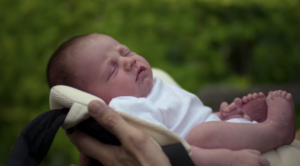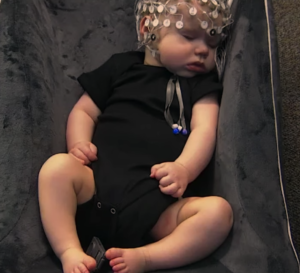
Summary:
The penultimate episode covers the “universal human challenge,” getting babies to sleep, as it is fundamental to their development. One of the narrators describes how sleep is when “the brain lives out its own existence,” and we are completely unaware. A family in London documents their experiences with their one-month-old son and his sleep patterns, detailing their own sleep deprivation. In New York City, Dr. Andre Fenton, director of the Neurobiology of Cognition Lab at NYU, studies when babies learn to sleep steadily like adults. Dr. Fenton gets his data from apps which parents use to track their baby’s sleep events. Parents record the events accurately to the minute, gathering millions of data points without needing to be measured by the researchers. Along with Dr. Pascal Wallisch, Dr. Fenton discovered there is an initial cycle of eating and sleeping starting around four months and there is a clear pattern within a year, with babies consistently sleeping through the night.
At the University of Iowa, Dr. Mark Blumberg, a professor of psychology and brain sciences, explains the circadian rhythm, a cycle tied to the sun which comes from the hypothalamus as well as the brainstem. He shows how younger babies cycle from sleep to wakefulness very quickly and found that connections between the hypothalamus and brainstem are not initially present, but when they do connect, they start giving rise to the circadian rhythm. Dr. Blumberg shows videos of multiple species of animals that twitch in their sleep, describing that many consider the movements to be “byproducts of dreams.” In the lab, babies are observed using an EEG headpiece and allowed to sleep. When a baby is twitching, the brain is sending out a signal, trying to “map the body,” learning about the synergies of muscles and how they control joints.
In Amherst, MA, Dr. Rebecca Spencer, a professor of Psychological and Brain Science, at the University of Massachusetts, studies how sleep makes learning and memory better. In the lab, infants are shown toys and the researchers play with them in certain ways. Then the babies are given the toys to see if they play with them in the same way as the researchers. Afterward, the babies are either kept awake or allowed to nap, and then they see whether the babies remember the actions with the toys. When the babies are not allowed to nap, they remember less of the objects and play with them in a new way compared to the babies who napped. After analyzing the nap brain data, Dr. Spencer explains that sleep spindles, a type of brain wave, are important for transferring information from the short-term memory area, the hippocampus, to the long-term memory areas in the cortex. She illustrates that babies need to sleep multiple times a day in order to more frequently move memories from short-term to long-term more frequently than adults, as they are learning so much about the world in a short period of time. Dr. Spencer concludes the episode by emphasizing the importance of sleep for our cognitive and emotional health throughout our entire life.

Review:
The article titled “Sleeping like a baby: Examining relations between habitual infant sleep, recall memory, and generalization across cues at 10 months,” offers data which demonstrate the importance of infant sleep for the formation of memory (Lubowski and Milojevich, 2013). The main results indicated that babies were better at remembering actions after a two-hour delay and there was a positive correlation with the amount of time spent napping (374). However, the study also had results which demonstrated a negative correlation between the percent of sleep completed at night and memory performance, a fact contrary to popular opinion (374). From this study, it was better for the babies to sleep more during naps than to sleep more at night in order to have higher scores on the memory tests. Therefore, the study reaffirms common knowledge of the importance of sleep in memory and emphasizes the importance of napping for infants around the age of 10 months.
